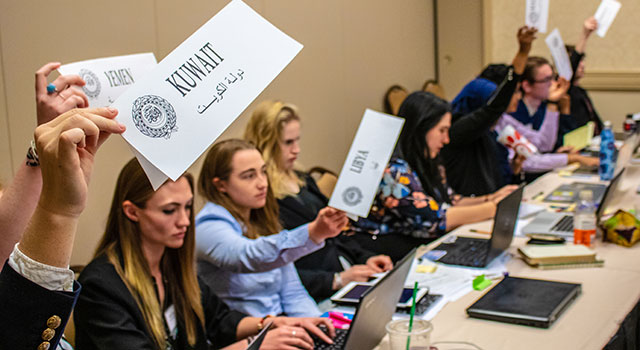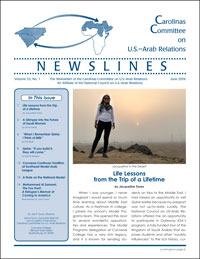AMBASSADOR MURPHY HEADS COLLECTIVE OF NATIONAL COUNCIL ADVISORS GUIDING U.S.-ARAB RELATIONS EDUCATIONAL PROGRAMS
Washington, D.C.: The National Council on U.S.-Arab Relations [ncusar.org], founded in 1983, is pleased to announce that Ambassador (Ret.) Richard W. Murphy, one of America’s most accomplished Arabist statesmen, has been named Co-Chair of the Council’s International Advisory Board. The Board’s other Co-Chair is HRH Prince Abdulaziz Bin Talal Bin Abdulaziz Al Saud. While the International Advisory Board does not formally govern the organization, its members make suggestions and recommendations. They also provide strategic support to the Council’s Board of Directors together with its Founding President and Chief Executive Officer.
In announcing the appointment, National Council Founding President and CEO Dr. John Duke Anthony and Board of Directors Chairman John Pratt stated, “We are honored that Ambassador Murphy has accepted Co-Chairmanship of the Council’s Advisory Board. The evidence of Ambassador Murphy’s exemplary record of public service is abundant and impressive. His command of Arabic and intercultural skills have been honed and tested for decades. His extensive empirical experience navigating the Arab region’s strategic and geopolitical challenges and opportunities is virtually unmatched. His integrity is beyond question. Ambassador Murphy will be an extraordinarily valuable resource and advisor as we work to continuously improve, strengthen, and expand the Council’s U.S.-Arab relations leadership development and bridge-building educational efforts.”

Ambassador (Ret.) Richard W. Murphy
Ambassador Murphy served in the United States Foreign Service for 34 years. His early career postings in the Arab region included Beirut, Lebanon; Aleppo, Syria; Jeddah, Saudi Arabia; and Amman, Jordan. From 1968-1971, he was Country Director for the Arabian Peninsula and Director of Personnel for the Department of State’s Bureau of Near Eastern and South Asian Affairs.
In 1971, President Nixon appointed Ambassador Murphy as U.S. Ambassador to Mauritania. From 1974 to 1983, he served successively as Ambassador to Syria, the Philippines, and Saudi Arabia. Between 1983 and 1989, he held the highest possible position of any specialist in the United States Government with regard to the Arab region, the Middle East, and the Islamic world: Assistant Secretary of State for Near Eastern and South Asian Affairs. During this period, he took an active role in the Arab-Israeli peace process.
In 1985, Ambassador Murphy was named Career Ambassador. Illustrative of the high professional esteem, innumerable accomplishments, and unrivalled prominence that this position reflects, it is a title held by only five of America’s thousands of diplomats serving at any given time.







You must be logged in to post a comment.